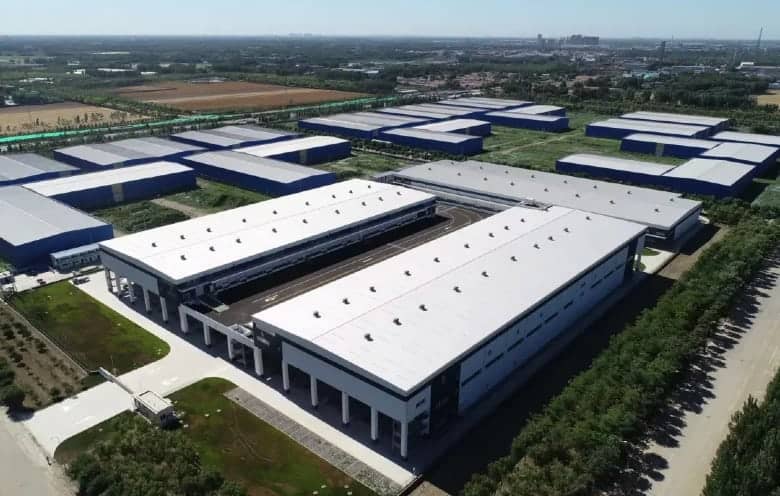
A LaSalle logistics facility near Beijing
LaSalle Investment Management on Thursday announced the $972 million final closing of the LaSalle China Logistics Venture fund, the Chicago-based fund manager’s first dedicated China logistics vehicle.
The completion of the capital raise comes as LCLV and its co-investment vehicle have already committed $423 million across 15 investments, including three recent acquisitions in Shanghai, Nanjing and Tianjin, LaSalle said in a press release. The fund is expected to have an investment capacity of up to $2.5 billion.
“China has always been a key growth market for LaSalle,” said Keith Fujii, LaSalle’s head of Asia Pacific. “The successful close of LCLV will allow us to pursue compelling investment opportunities and expand our on-the-ground investment footprint, drawing upon our regional resources and local expertise in the sector.”
LaSalle is closing on the logistics vehicle after prime warehouse rents in China’s first-tier cities rose between 1.5 and 3 percent on average during the first half of 2021, according to statistics from Knight Frank, as the mainland’s e-commerce growth continues to fuel demand for distribution space.
US Institutional Backing
News of the final closing comes just two weeks after Mingtiandi reported that LaSalle had secured $80 million worth of fresh capital commitments from two US public institutions in support of LCLV.

Claire Tang, head of Greater China for LaSalle Investment Management
The Texas Permanent School Fund, a sovereign wealth fund that provides education revenue in the second-biggest US state, pledged $50 million to LCLV, according to an account at IPE.com.
Meanwhile, the Sacramento County Employees Retirement System, a pension fund serving the area around California’s state capital, chipped in $30 million during the third quarter to LCLV, as stated in an August report of SCERS’s investment activity.
LaSalle has not disclosed the fund’s other backers, describing them simply as a diverse group of new and existing global investors from North America, Europe, the Middle East and Asia.
LaSalle, an independent affiliate of property services firm JLL, raised $681 million for LCLV’s first closing last year, seeding the non-core fund with two development sites in the Shanghai area, plus one stabilised asset each in Wujiang (Jiangsu province), Huizhou (Guangdong province) and Tianjin.
Shed Shopping on the Mainland
LCLV targets first- and second-tier cities in key logistics regions including the Yangtze River Delta (Greater Shanghai), Bohai Bay (Greater Beijing) and the Greater Bay Area (southern China). The fund seeks to acquire and develop modern logistics assets, as well as reposition underperforming assets. Cold chain logistics is also a focus of the fund, benefiting from rising demand from the fresh food sector in China.
The two development projects in LCLV’s initial portfolio are located in Jiaxing, just south of Shanghai in Zhejiang province, and Kunshan, an industrial hub west of east China’s largest city in Jiangsu.
“The China logistics sector continues to be underpinned by solid fundamentals — strong domestic consumption coupled with a rapid acceleration in e-commerce adoption post-COVID,” said Claire Tang, head of Greater China at LaSalle.
LaSalle’s track record in the Chinese logistics sector includes more than $2.1 billion in transactions completed since 2008. The company manages over $6 billion in logistics investments in Asia, across key markets such as China, Japan, Korea and Australia.
Investment Boom Continues
China’s love of e-commerce and maturing retail sector have helped support a range of logistics investment vehicles, with developers GLP and ESR having announced fundraising milestones in recent months and local competition also gaining traction.
Just over a week ago, GLP announced a $1.75 billion first closing on its third China logistics development fund, on its way to a $2 billion target. In August, Hong Kong-listed ESR announced a $4 billion development vehicle backed by Dutch pension fund manager APG and Singapore’s GIC.
At the start of September, a real estate division of JD.com announced that it was buying a controlling stake in Hong Kong-listed China Logistics Property for $513 million, as China’s second-largest e-commerce provider sought to expand its own warehouse footprint.
Earlier in the third quarter, Shanghai-based logistics developer New Ease raised $488 million from Goldman Sachs for a warehouse joint venture after the firm had sold a pair of mainland sheds to PGIM in June.
Leave a Reply